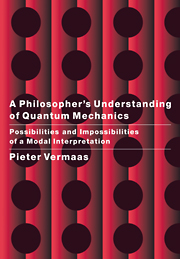 A Philosopher's Understanding of Quantum Mechanics
A Philosopher's Understanding of Quantum Mechanics Book contents
- Frontmatter
- Contents
- Preface
- 1 Introduction
- 2 Quantum mechanics
- 3 Modal interpretations
- Part one Formalism
- Part two Physics
- Part three Philosophy
- 12 Properties, states, measurement outcomes and effective states
- 13 Holism versus reductionism
- 14 Possibilities and impossibilities
- 15 Conclusions
- Appendix A From the bi to the spectral modal interpretation
- Glossary
- Bibliography
- Index
12 - Properties, states, measurement outcomes and effective states
Published online by Cambridge University Press: 28 October 2009
- Frontmatter
- Contents
- Preface
- 1 Introduction
- 2 Quantum mechanics
- 3 Modal interpretations
- Part one Formalism
- Part two Physics
- Part three Philosophy
- 12 Properties, states, measurement outcomes and effective states
- 13 Holism versus reductionism
- 14 Possibilities and impossibilities
- 15 Conclusions
- Appendix A From the bi to the spectral modal interpretation
- Glossary
- Bibliography
- Index
Summary
Starting with a more philosophical review, I discuss how modal interpretations describe reality. Firstly, it is shown that they describe states of affairs which need not be observable. Secondly, I underpin my position that in order to be metaphysically tenable, interpretations need only to satisfy the criteria of Consistency and Internal Completeness. Thirdly, I analyse how properties, states and measurement outcomes are related to one another within the modal descriptions of reality. Finally, I show how modal interpretations recover the standard formulation of quantum mechanics if one defines, in addition to the true states, so-called effective states of systems.
Noumenal states of affairs
The aim of an interpretation of quantum mechanics is, as I said in the introduction, to provide a description of what reality would be like if quantum mechanics were true. This formulation underlines two aspects of interpretations. Firstly, interpretations intend to construe quantum mechanics in terms of a description of reality and not merely in terms of the outcomes of measurements. Secondly, this description need not be correct. The objective is only to prove that there exists a construal of quantum mechanics which yields an acceptable description of reality. And because it is already difficult enough to give such a proof of existence, it is not (yet) the aim of interpretations to provide the one and only correct description of reality.
The above formulation, however, disregards another aspect of interpretations of quantum mechanics, namely that they describe states of affairs which need not always be observable.
Information
- Type
- Chapter
- Information
- A Philosopher's Understanding of Quantum MechanicsPossibilities and Impossibilities of a Modal Interpretation, pp. 209 - 223Publisher: Cambridge University PressPrint publication year: 2000